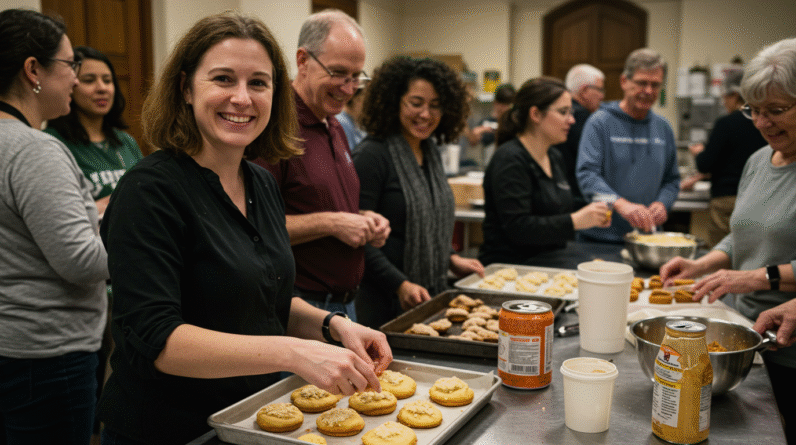Using Your Talents To Shine The Light Of Christ In The World
You weren’t created by accident. You weren’t given abilities to hide them under a bushel. God made you on purpose, for a purpose, and He equipped you with resources—talents, skills, personality, experience—so you could make a difference for His kingdom. When you start seeing your natural abilities as tools for ministry, everyday life becomes a mission field. By using talents for God, you honor the Giver and become a practical witness of Christ’s love in homes, workplaces, neighborhoods, and online communities. This isn’t about celebrity; it’s about stewardship. It’s about responding to a divine invitation to let your light shine.
In this article you’ll find biblical foundations, practical steps to discover and develop your gifts, ways to overcome common obstacles, and concrete examples of how to use what you’ve been given to serve others. I’ll guide you as if I were preaching from the front pew—gentle, direct, and hopeful—because you can start today, with the gifts you already have. You don’t need to wait for more training, a dramatic revelation, or a better schedule. You simply need to begin using what God has already given you.
Why Your Talents Matter to God
God cares about what you do with what He has given you. Your talents are not merely for your own success or comfort; they are instruments of worship and service. The Bible reminds you that you are God’s workmanship, created to do good works that He prepared in advance for you to do. Ephesians 2:10
That’s powerful because it flips the script on your life’s purpose. Instead of asking, “What will make me happy?” the better question becomes, “How will I use my abilities to love God and serve others?” When you frame your talents in those terms, you step into a story bigger than your resume. You step into God’s mission. You have something unique to offer—whether it’s leadership, compassion, creativity, administration, humor, discipline, or hospitality—and God intends for those things to be useful in His kingdom.
Biblical Foundation for Using Your Gifts
The Bible consistently treats gifts, talents, and abilities as resources for the common good. Scripture talks about spiritual gifts distributed by the Holy Spirit for the building up of the church and the advancement of God’s work in the world. Read how Paul lists and describes diverse gifts and their purposes; it reminds you that variety is God’s design. 1 Corinthians 12:4-11
Paul’s teaching in Romans echoes that message—you have a measure of faith and gifts according to God’s grace; you’re to employ them responsibly. Romans 12:6-8 And Peter makes it clear that whatever gifts you have should be used to serve others faithfully, as good stewards of God’s varied grace. 1 Peter 4:10
When Scripture calls you to serve, it’s not asking you to surrender your personality. Instead, it calls you to invest your personality in service. That’s why you can be both uniquely you and useful to God’s purposes. Every gift is important—but no single gift is everything. Not everyone is called to be a preacher, and that’s okay. God’s body needs the teacher and the encourager, the speaker and the listener, the strategist and the hands that serve quietly. In other words, your unique package of talents is precisely what the church and the world need.
The Parable of the Talents: A Clear Mandate
Jesus told a story about servants entrusted with resources; the master expected them to use their gifts wisely and productively. The parable is a call to risk, faithfulness, and responsibility. Read the parable and let it shape your thinking about stewardship. Matthew 25:14-30
The point Jesus makes is straightforward: God expects you to be active with what you’ve been given. He’s not looking for perfect performance; He’s looking for faithful effort. Hiding what you can do out of fear or laziness is not an option for a follower of Christ. The reward is not just praise from God—it’s the expansion of God’s kingdom as your gifts are multiplied and used to bless others.
How to Discover Your God-Given Talents
Finding your gifts is a process, not an instant download. You can accelerate that process with intentional steps: prayer, observation, feedback, experimentation, and training. Start where you are and ask God to show you. He’s not hiding your gifts from you—He’s waiting for you to say yes to exploring them.
Observe what energizes you. What tasks leave you feeling alive rather than drained? Where do people regularly thank you? Where do you naturally carry responsibility? Those repeated patterns point to strengths. Ask trusted friends, family, or leaders to tell you what they see—often others can name strengths you take for granted.
Experiment without pressure. Try serving in a new area in your church or community for a season. Measure where you have the most impact and where you feel fulfilled. Keep a journal of successes and struggles; over time, a pattern will emerge. Consider taking a spiritual gifts assessment as a tool—not a test of identity but a starting place to guide your experiments.
If you want to be strategic, link discovery to action: pick one small way to use a suspected talent this week. Put a timeline on it. Invite feedback. That’s how you’ll turn potential into practice.
Practical Exercises to Identify and Grow Your Talents
You don’t have to be passive in this discovery. Try these exercises and permit yourself to learn:
- Keep a thirty-day “energy log.” Note activities that energize or deplete you.
- Serve in three different volunteer roles for three months each.
- Ask five people to describe your top three strengths.
- Set a measurable goal around one talent and track progress.
These exercises create clarity. You’ll begin to see where your passion, ability, and opportunity intersect. When those three meet, you’ve found the sweet spot where God can most clearly use you.
Why Using Talents For God Is a Witness
Jesus said, “You are the light of the world.” Your life is a signal to neighbors, coworkers, and family—people notice how you use what you’ve been given. Matthew 5:14-16
When you are intentional about using talents for God, you become a visible demonstration of God’s love. People don’t always respond to explanations, but they do respond to examples. A loving teacher can open a student’s mind to God; a compassionate doctor can show the compassion of Christ; a faithful employee can reflect the integrity that points back to a God who is trustworthy. Your gifts are a bridge between the gospel and a world that needs tangible expressions of grace.
Remember: a witness doesn’t require perfection. It requires faithfulness. It’s not about being flawless—it’s about being faithful. People don’t need perfect testimonies; they need authentic ones. Your honest, effective use of your gifts, even amid struggle, will testify to a God who works through imperfect people.

Overcoming Common Barriers to Using Your Talents
You’ll face obstacles—some internal, some external. Fear, comparison, perfectionism, busyness, and a “not enough” mindset will try to keep your gifts inactive. Address them head-on.
Fear: You might be afraid of failure or of making a fool of yourself. But remember the parable: playing it safe is not the model of faithful stewardship. Begin small, learn, and adjust.
Comparison: Don’t measure your gift by someone else’s ministry. God’s economy is not zero-sum; when you faithfully use your gifts, you add to the whole body. Focus on serving where you’re strongest.
Perfectionism: Waiting until you’re ready is usually a way of procrastinating. God often grows your capacities by putting you in situations that require growth.
Busyness: If your calendar is too full to serve, then your priorities need rearranging. Ministry is a lifestyle more than an event; it requires small, consistent choices.
Not-enough mindset: You might think you lack training, charisma, or resources. But God’s ordinary people are His chosen instruments. He multiplies what you offer when it’s offered with faith. [2 Corinthians 9:6-8]—(consider how giving, even when small, is met by God’s provision).
Practical Ways to Use Your Talents in Everyday Life
You don’t need a title to minister. The gospel is often most credible in ordinary places. Here are natural contexts where your gifts can shine:
- In your workplace: Use your leadership, humility, integrity, and excellence to influence culture. Share your faith naturally by how you treat people and the standards you uphold.
- In your family: Use empathy, patience, teaching, and hospitality to cultivate Christ-centered relationships. Children and spouses often learn faith from daily rhythms, not sermons.
- In your neighborhood: Use hospitality, organizational gifts, or creativity to host gatherings, help those in need, or start small community projects.
- In your church: Serve in teams that align with your talents—worship, administration, hospitality, teaching, or care ministries.
- Online: Share your art, writing, or encouragement through digital platforms—be a voice of hope in a noisy space.
Thinking practically, start by listing three ways you could use a current talent this month. Then do one. That first step is the hardest and the most important. By using talents for God in everyday situations, you make faith contagious.
Serving with Excellence: Work as Worship
The Bible teaches that whatever you do, work at it with all your heart as for the Lord and not for human masters. Colossians 3:23-24 This challenges you to see your daily responsibilities as an opportunity to worship.
Excellence isn’t about impressing people; it’s about honoring God with your best. When you do ordinary tasks with care, creativity, and integrity, people notice. Excellence is a silent sermon. It communicates that your faith matters in every part of your life. Keep in mind that excellence doesn’t equate to perfectionism. Excellence is the disciplined pursuit of quality motivated by love for God.
Continue using talents for God by showing up consistently and doing what you do with humility and competence. That kind of service opens doors to meaningful conversations and long-term influence.
Stewardship and Multiplication
God expects growth, not preservation. The servant who used his resources wisely multiplied them and received the master’s commendation. That parable calls you to be a multiplier, not a hoarder. Matthew 25:14-30
Multiplication happens when you invest your gifts in others—when you mentor, train, delegate, and release people to serve. It’s also the result of faithful stewardship: practicing your craft, learning, and applying feedback. If you keep your gifts boxed up on the altar of “someday,” they’ll never bless anyone. Stewardship means taking responsibility for development and deployment.
Practical stewardship looks like scheduling time to practice, seeking mentors, investing in training, and giving your best to assignments, large or small. When you steward what you’ve been given, God multiplies impact beyond what you could accomplish alone.
Building a Lifelong Practice of Serving
Using your talents for God is not a one-time event; it’s a lifelong practice. Habits matter. The more you serve consistently, the more your capacity grows and the more natural it becomes to see opportunities to bless others.
Set rhythms that support your gifts: regular times for prayer and reflection, scheduled opportunities to serve, and ongoing learning. Consider a five-year plan for one or two key talents: where do you want to be, and what steps will get you there? Break those down into quarterly and monthly actions.
Also, practice humility. The longer you serve, the easier it is to fall into pride. Keep a posture of gratitude and dependence on God. Remember: your talents are entrusted to you, not owned by you. They’re tools for building God’s kingdom, not trinkets to be admired.
Stories and Examples That Encourage
Stories help you imagine what’s possible. Consider a teacher who uses humor and creativity to teach kids both academics and grace. She didn’t set out to start a ministry; she started by caring well for the students in her class, and parents saw the love of Christ in her patience and joy. Consider a plumber who uses his downtime to mentor young men; his consistent presence made him a trusted counselor in his community. Or think of a young graphic designer who volunteered to update her church’s website and, in the process, helped the church reach people online who would not have come otherwise.
These are ordinary people, doing ordinary things faithfully. Their stories show that you don’t need a pulpit to be a missionary. You need a willing heart, a few skills, and a consistent commitment to love well. That’s how the church grows—through everyday faithfulness.
The Role of the Holy Spirit in Empowering Your Gifts
You don’t operate in your own strength alone. The Holy Spirit empowers, equips, and guides you in the use of spiritual gifts and natural talents. Paul describes gifts as distributed by the Spirit for the common good. 1 Corinthians 12:4-11 The Spirit makes your gifting effective, connects it to God’s timing, and often counsels you on when to speak and when to be silent.
Pray for wisdom and boldness. Ask the Spirit for opportunities to love sacrificially and for clarity about how to serve. The Spirit will often confirm your use of gifts through peace, affirmation from others, and open doors. When you rely on your own ability alone, you risk burnout and pride; when you depend on the Spirit, you find strength, guidance, and fruitfulness that far exceed your natural capacities.
Pray to Use Your Talents for God
A simple, honest prayer can change your posture: “Lord, I want to use the gifts you’ve given me to serve you and others. Show me how. Give me courage to start, wisdom to grow, and humility to learn. Use my strengths and forgive my weaknesses. Let my life point others to Jesus.” Prayer aligns your will with God’s and invites divine participation in your efforts.
If you pray consistently like this—short, specific, and faithful—you’ll start to see doors open. The Spirit works in ways you cannot always predict, but He is faithful to equip those who say yes.

Practical Next Steps You Can Take This Week
You don’t have to wait to begin. Here are some immediate actions to move from intention to practice:
- Choose one talent you suspect you have and commit to using it intentionally this week.
- Ask one person you trust to give honest feedback about where you shine.
- Volunteer for a short-term project where your talent could be useful.
- Pray daily for God to multiply your efforts and open doors for impact.
These are small, practical moves, but they compound. When you begin taking consistent steps, you’ll build momentum and increase your influence.
Frequently Asked Questions (Brief)
What if I don’t feel gifted? Many gifted people feel inadequate. Talent often hides in plain sight. Start with service, not self-judgment. God grows gifts through obedience.
What if my gifts seem ordinary? Ordinary gifts used faithfully do extraordinary things. God does His best work through ordinary people who say yes.
Can I develop gifts over time? Absolutely. Gifts can be refined through practice, training, and mentorship. You can grow.
How do I balance family, work, and ministry? Prioritize. Ministry isn’t always more important than family or job; often it complements them. Look for ways to integrate service into your daily life.
Final Encouragement
You are a steward of gifts given by a generous God. Using talents for God is not an optional extra for the spiritual elite; it’s central to what it means to follow Jesus. Don’t wait for applause or permission. Start where you are with what you have. Be intentional, practice consistently, rely on the Holy Spirit, and multiply what you’ve been given by investing in others.
When you choose to use your gifts faithfully, you not only grow personally—you expand God’s kingdom. Your life becomes a lamp, shining in a world hungry for hope, beauty, compassion, and truth. That’s how God changes hearts: through ordinary people living extraordinary lives of service.
Keep using talents for God. Give your best to the Lord, and trust Him to take your small offerings and do immeasurably more than you could ask or imagine.
Explore More
For further reading and encouragement, check out these posts:
👉 7 Bible Verses About Faith in Hard Times
👉 Job’s Faith: What We Can Learn From His Trials
👉 How To Trust God When Everything Falls Apart
👉 Why God Allows Suffering – A Biblical Perspective
👉 Faith Over Fear: How To Stand Strong In Uncertain Seasons
👉 How To Encourage Someone Struggling With Their Faith
👉 5 Prayers for Strength When You’re Feeling Weak

📘 Jesus and the Woman Caught in Adultery – Grace and Mercy Over Judgement
A powerful retelling of John 8:1-11. This book brings to life the depth of forgiveness, mercy, and God’s unwavering love.
👉 Check it now on Amazon
As a ClickBank Affiliate, I earn from qualifying purchases.
Acknowledgment: All Bible verses referenced in this article were accessed via Bible Gateway (or Bible Hub).
“Want to explore more? Check out our latest post on Why Jesus? and discover the life-changing truth of the Gospel!”








